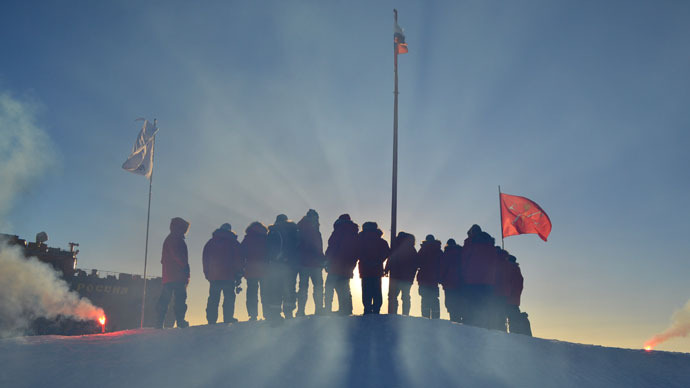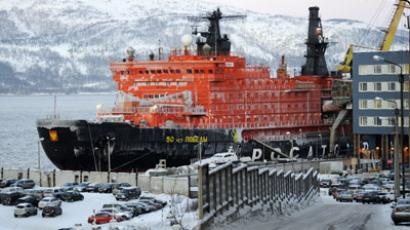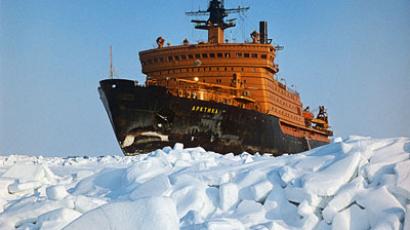Northern exposure: Ice melt inspires race for Arctic riches

Six countries have broken the ice and won Arctic Council observer status at the latest conference. Melting Arctic ice is exciting countries remote from the region, seeking access to promising hydrocarbon deposits and new logistics routes.

Arctic climate change is progressing twice as fast as in the rest of the world. As the Arctic ice cap decreases year by year, the vast Arctic natural resources and sea routes are becoming more accessible.
This biennial Arctic Council ministerial session has been hosted in Sweden’s northernmost town of Kiruna. The session has been attended by top diplomats and officials. Russia’s Foreign Minister Sergey Lavrov and the US Secretary of State John Kerry were both present.
Arctic Council members:
Canada, Denmark, Finland, Iceland,
Norway, Russia, Sweden, the US
Arctic Council observers (including the new ones):
Britain, China, France, Germany, India, Italy, Japan,
the Netherlands, Poland, Singapore, South Korea, Spain.
The main intrigue of this year’s session has been the 14 bidding
countries, foremost China, which have been trying to
acquire an observer state status in the council to keep a finger on
the decision-making pulse of the organization, attend the AC
meetings and propose new projects.
The session agreed to grant permanent Arctic Council observer
status to only six states out of 14 bidders: China, India, Italy,
Japan, Singapore and South Korea.
AC observer status can only be granted if all permanent members of the council agree to it. That did not happen this time to the EU, for example, the bid of which has been postponed.
Also at the session, Canada took over the chairmanship from Sweden, which presided in the AC for the last two years.

Tropical icemen: Asian economies ram Arctic access
The biggest Asian economies - Japan, China and India - have all expressed readiness to join the Arctic race and were introduced to stage one of the Arctic Council.
But among them there is a country that invested heavily to give legs to its bid - China.
“Joining the council is more a political statement from countries like China,” Malte Humpert, an executive director at the Washington-based nonpartisan think tank Arctic Institute, told The Wall Street Journal. “The idea of having a seat at the table in a region that is likely to become another realm of geopolitics.”
Beijing has been heavily investing into the northern states in recent years, particularly Iceland, which this April signed a free-trade deal with Beijing – the first in Europe - and Denmark, visited by now former Chinese President Hu Jintao in June 2012. Chinese businessmen are particularly interested in investing in Denmark’s self-governing Greenland.
Chinese Arctic activities seem to bear fruit as the Nordic countries finally supported China’s membership of the AC.

"Our opinion is that the countries which have a legitimate interest in discussing Arctic issues must be accepted as observers in the Arctic Council," Danish Foreign Minister Villy Sovndal said recently in an interview.
China’s main economic rival in Asia, India, also has got on the Arctic train and is actively attaining commitment of the AC member states, first and foremost Russia’s – having been Moscow’s most devoted arms buyer for years now.
It must be mentioned that so far Canada, which will preside in the council till 2015, has been rather cautious about granting AC observer status to newcomer nations. Ottawa anticipates that further expansion of the observer nations might shift the agenda of the body away from the needs of Arctic indigenous peoples or even replace the AC gatherings to other places from the actual Arctic region.
Leona Aglukkaq, the minister of Canada’s Northern Economic Development Agency, said that admission of new observers is a "serious issue."
Aglukkaq, raised in the Arctic himself, shared concern that the voices of the indigenous participants "are not diminished."
The Russian Foreign Ministry has specified its stance, pointing out that a new observer must “respect the Arctic countries' sovereignty, sovereign rights and jurisdiction in the Arctic.”

When the Arctic Council was formed in 1996, it was for years regarded as a coordination body for environmental issues and scientific research.
But the more the Arctic ice melts, the more persistent prominent financial capitals are to become regional players in the extreme north. They realize that the Arctic region’s emergence as a new geopolitical center is on the horizon.
As of now the Arctic is dominated by the eight member countries of the Arctic Council, which have de jure divided the region into zones of national interest and are eager to keep the status quo.














